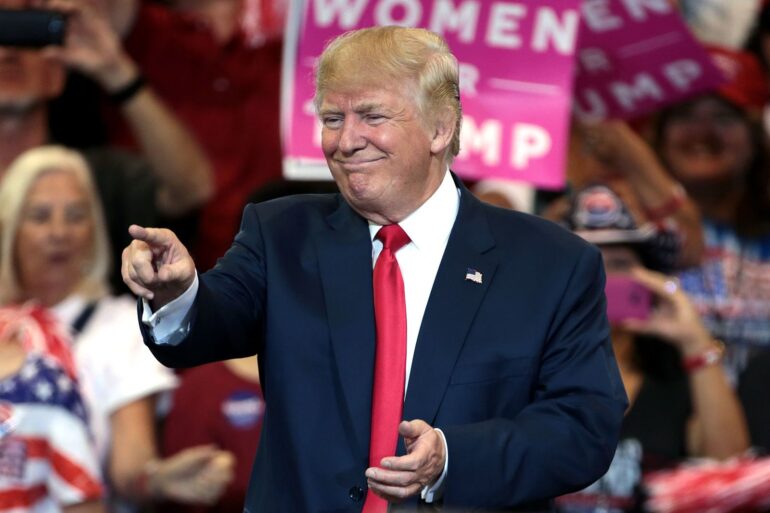The circus of publicity and controversy surrounding a new book by Israeli journalist Barak Ravid, Trump’s Peace: The Abraham Accords and the Reshaping of the Middle East, has for the most part confirmed much of the analysis of the relationship between former United States President Donald Trump and former Israeli Prime Minister Binyamin Netanyahu (Likud) presented in Vision Magazine during Trump’s four years in office.
In recently released excerpts of a recorded interview with Ravid, Trump is heard castigating Netanyahu for blocking Trump’s efforts to divide the land of Israel. Trump said he believed Netanyahu “did not want to make peace. Never did.”
The former US president further claimed that he had prevented Netanyahu from legally annexing portions of the West Bank to the State of Israel. “I got angry and I stopped it,” he said.
Trump also expressed a favorable opinion of Defense Minister Benny Gantz (Blue & White).
“So, Benny Gantz. I really like him a lot. I thought he was great. He came to the White House. He was someone that, in my opinion, it would have been much easier to make a deal with the Palestinians… In fact, I said to Jared [Kushner] and David [Friedman], that if he became the guy, if he won, I think it would be a lot easier.”
The full picture of what all this reveals only confirms what should have become obvious to everyone during Netanyahu’s speech at the inauguration of our current government. Bibi, despite his many flaws, had spent the last 12 years protecting Israel from Washington. Both from Barack Obama and from Donald Trump.
Trump’s comments about Netanyahu not wanting to “make peace” should of course be understood within the context of how US foreign policy has always understood “Israeli-Palestinian peace” – the partition of our country into two separate states, each dependent on Washington for survival. That Bibi successfully resisted Trump’s two-state “Deal of the Century” should earn him the gratitude of Israel’s national camp.
In the years leading up to the unveiling of Trump’s closely guarded plan, Vision Magazine had consistently asserted that it would be a program aimed at partitioning the country into two states. In the months following its unveiling, we called for it to be resisted in its entirety and pushed back against absurd claims on the Israeli right that Jerusalem could annex 30% of the West Bank while ignoring the parts of Trump’s vision that called for Israel to surrender the remaining 70.
Despite what Vision Magazine said were obvious signs that the Trump team would try to force Israel into accepting the country’s partition, the administration was successful at neutralizing most of the Israeli and Diaspora Jewish figures who would normally oppose such a program.
The Trump administration seduced the Israeli right and its Diaspora supporters, deceptively granting them access and a proximity to power they had never before experienced. Because most Jewish nationalists lack the geo-political awareness to understand US interests or how imperialism operates, they were easy to manipulate and reassure in their moments of doubt.
Trump, meanwhile, worked to chain Netanyahu to his agenda by moving the US embassy to Jerusalem and recognizing Israeli sovereignty over the Golan Heights.
Most ridiculous of all were the voices – including that of current Prime Minister Naftali Bennett (Yamina) – that claimed it was Netanyahu who decided against applying Israeli sovereignty over parts of the Samaria and Judea regions despite a supposed green light from Washington. The revelations provided by Ravid’s interviews should silence these voices in the future (but probably won’t). The complete ignorance for the role US interests and demands play in Israel’s major policy decisions is arguably the Israeli national camp’s greatest weakness (it should be noted that Bennett has shown himself to be especially weak on this front and has even allowed for increased US control over Israeli defense policies).
Trump’s stated preference for Gantz may not be conclusive but it does lend credibility to claims by Vision Magazine that Trump had wanted Gantz in the government and interfered in Israel’s political system through Avigdor Lieberman (Yisrael Beiteinu) to ensure Netanyahu not be able to form a coalition without Blue & White. If true, this would make Trump’s team primarily responsible for the political instability that plagued Israel in recent years and ultimately led to Netanyahu’s removal from office.
Donald Trump wasn’t the great friend to Israel that so many right-wing Jews understood him to be. His “Deal of the Century” was essentially a repackaging of the same partition plan Washington has been trying to impose on our country since the Six Day War. But the fact that Trump succeeded in manipulating and for the most part neutralizing Jewish nationalist opposition to his plan should alert us to the fact that loyalty to the homeland and Jewish national consciousness – no matter how deep – aren’t sufficient to resist efforts to divide our land if not coupled with a principled materialist understanding of geo-political issues.
What’s clear moving forward is that Israel needs to disconnect from the United States, not only because the empire appears to be in rapid decline but also because the Jewish people didn’t come back to life after 2,000 years merely to serve as an outpost of American power. A responsible and capable Israeli leadership would act independently of Washington and unilaterally apply sovereignty over all the territory between the river and the sea – but would do so in such a way that’s just for all peoples here and doesn’t offer foreign governments any moral authority to intervene.





